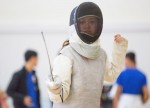All Dorothy Yu had were her pants, jacket, socks and shoes. That wasn’t nearly enough gear to compete in a fencing tournament.
Among other things, she was missing a sword and mask. She scrambled around all morning trying to scavenge all the necessary pieces to compete at Sunday’s Okawa Fencing Tournament held at the Student Activities Center.
As she entered the gym, clings, clangs and buzzers echoed nonstop around her. There were as many as 14 strips – the long, narrow dueling areas used by fencers – available for matches, and the participants already made full use of them for warm-ups.
Swords struck swords. Fencers bounced around on the balls of their feet. The buzzer blared almost every 10 seconds, signaling that someone was hit.
“I didn’t know where to go,” said Yu, a first-year microbiology, immunology and molecular genetics student. “It was hectic. I was all over the place.”
It was so hectic that Yu wasn’t in the gym to hear the final registration call for her event – the foil. She came back to find registration closed, but after a few suspenseful moments, she was put on the list.
Yu didn’t even have time to fit in a proper warm-up before her name was called and she had to walk up to the center of her strip.
“En garde, ready, fence.”
The frantic morning with all its discordant sounds faded into the background as Yu, a fencing newcomer who wasn’t expecting wins but was eager to learn from the experience, steeled herself.
Just like that, she walked forward on the strip, stepping into one of the most competitive fencing competitions in Southern California.
Three months ago, Yu went out to her first UCLA Fencing Club meeting. Her roommate really wanted to try it out, and Yu, having occasionally watched the sport during the Olympics, was curious enough to tag along.
It didn’t happen instantly, but gradually the fundamental techniques of fencing hooked Yu into coming out regularly to the practices. She quickly grew attached to the foil, the thinnest and often quickest of the three weapons in fencing.
Fourth-year electrical engineering student Howard Chen estimated that it takes at least a year for a newcomer to understand what’s really going on.
“There are so many little things in fencing against people who actually know what they’re doing,” Chen said. “Someone new can’t really register what’s going on quickly enough. It usually takes several months to even start to understand what you’re doing.”
Yet Yu competed at Sunday’s Okawa tournament, known for its competitiveness and the high-level fencers it attracts from across California.
She was placed into a group of six other fencers in phase one of the tournament, where each fencer would face every competitor in their pool once.
Yu’s first matchup was against 2008 UCLA alumna Jamie Lam, who goes to the UCLA Fencing Club practice once a week to help out.
“When I was here, I had older fencers help me and that was a great experience,” Lam said. “I wanted to bring that here too to make sure that they’re also enjoying themselves and they’re getting better.”
The club team has generally relied on older members to teach and train new fencers. Its current coach was only hired at the beginning of spring quarter.
While the Okawa Fencing Tournament wasn’t Yu’s first official competition, she still was not too sure about how everything worked. In the first match, Yu had trouble strapping herself into all the different sensors and cables, so Lam walked over and helped her teammate do so.
The match itself ended quite quickly: 5-0 Lam.
But the second the match was over and the masks came off, Lam already had advice ready for Yu as they walked off the strip together.
“It’s a little bit frustrating because I’m wondering why I can’t hit them,” Yu said. “But after your mentor shows you the ropes, it makes things a lot easier and you get into the rhythm of fencing.”
In her next four matches, Yu no longer had trouble strapping herself in before each match, but she still found herself losing 5-0 in each. Her opponents were just too experienced and pounced on the 5-foot-3 Bruin, initially fighting aggressively but switching to a more defensive approach as each match wore on.
And between each match, Lam was always there talking to Yu, helping out.
It wasn’t just Lam, but other teammates, like 2013 UCLA alumnus Andrew Tsai, would wander over to Yu’s strip to offer support.
“The club has a very unique atmosphere,” Tsai said. “It’s very laid-back. Your teammates are also the people who teach you so it’s an interesting relationship.”
In the sixth and final match, as Yu lined up with the foil clutched in her right hand and her left hand balled up into a fist that barely poked out of a bit-too-big jacket, Lam yelled, “Just keep moving!”
Yu fell behind 3-0, but then took herself by surprise by scoring her first point of the tournament. And then another to make it 3-2.
Her teammates were there yelling and cheering, and even through the dark mask, a smile unmistakably flickered through.
Though Yu would go on to lose the match 5-3, and then 15-1 in the elimination-style phase two, she had not come into the tournament with a win-or-lose approach.
Sunday was about improving her technique and just enjoying the sport.
“If I don’t have the right technique and know how to strategize, who am I to be frustrated about the outcome?” Yu said.
Despite the outcome, Yu knows she learned and improved by just competing in and watching others in the tournament.
Despite a couple of hiccups earlier in the morning, she managed to score a couple of points against a far more experienced fencer.
And that’s something that just three months ago, Yu could never have done.
